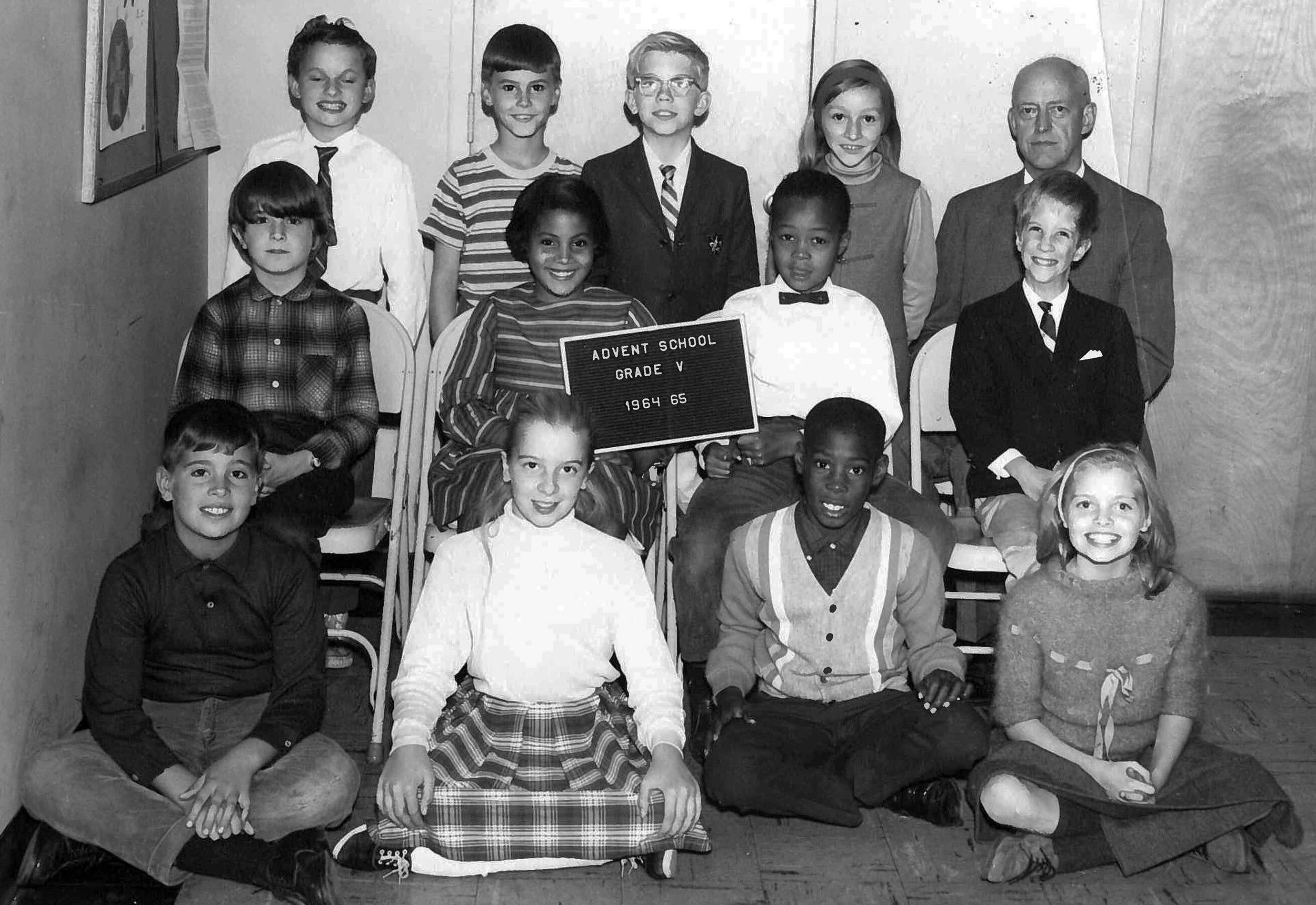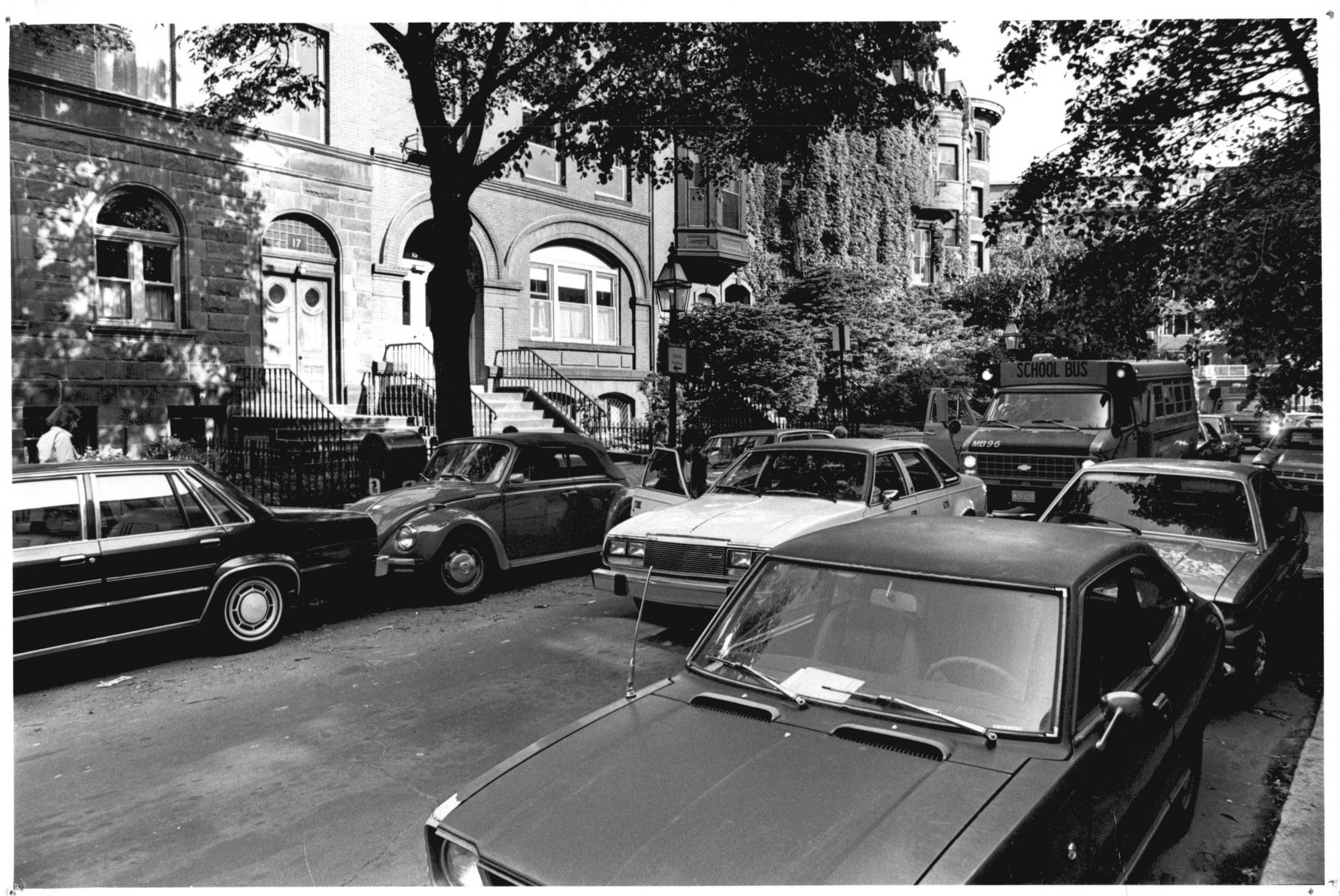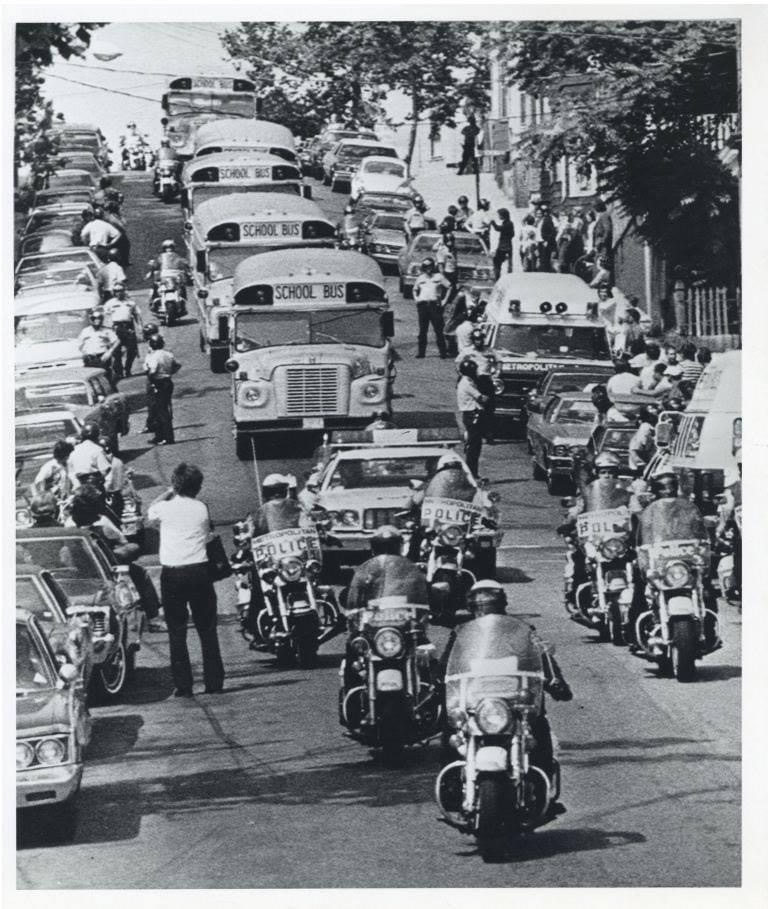
A Lasting Legacy
The Advent School’s history fits into the broader histories of racism, religious education, and progressive education in the United States. Advent was founded in direct response to the social and political climate in Boston during the 1950s and 1960s.
“May 17, 1954
The Supreme Court rules that schools segregated by race are unconstitutional in the Brown v. Board of Education decision.”
“”We conclude that, in the field of public education, the doctrine of ‘separate but equal’ has no place. Separate educational facilities are inherently unequal.” - US Supreme Court, Brown v. Board of Education”
“Boston Public Schools, despite the 1954 Brown v. Board of Education decision, remain largely de facto segregated due to policies that gerrymander neighborhood borders.”
“1959
A group of forward thinking Beacon Hill community members decide to open up a fully integrated neighborhood school in conjunction with The Church of The Advent. Seven community members including Revered Samuel J. Wylie, the rector of The Church of The Advent, worked together with Mona Hull, Advent’s founding Head of School, to create the vision for The Advent School. At its founding, The Advent School’s purpose was “to operate a school, designed to promote educational and spiritual development of children and to provide regular instruction in the Christian faith.” ”
““Our children live together. They should learn together in reflection of the city they come from.” - Mona Hull”
“January 24, 1961
The Taylor v. Board of Ed. of City School District of New Rochelle Court ruling finds that the Board of Education of the City of New Rochelle had intentionally created and maintained the Lincoln Elementary School as a racially segregated school, and had not acted in good faith to implement desegregation as required by the Fourteenth Amendment. ”
“The Taylor v. Board of Ed. of City School District of New Rochelle ruling marks the first time that a Northern city is ordered to desegregate. Some Boston residents, fearing that Boston will inevitably be forced to desegregate as well, flee the city for the suburbs during what is now referred to as “white flight.””
“May 22, 1961
The Advent School Corporation holds its first meeting.”
“July 21, 1961
The Advent School is incorporated by the Commonwealth of Massachusetts under then Secretary of State Kevin White, who went on to become the 51st Mayor of Boston and sent his children Mark, Beth, and Caitlin to The Advent School.”
“September 14, 1961
With the championship of the Beacon Hill community, the City of Boston, and parishioners from Church of the Advent, Mona Hull opens The Advent School on a shoestring budget in the Parish House of The Church of The Advent. Families are drawn to The School’s progressive statement that “The school is concerned with the development of the whole child and offers programs to promote the intellectual, physical, cultural, artistic, and religious development of students with individual attention given to each child’s needs and abilities.””
“May 22, 1962
Roger Moore, The Advent School’s Board Secretary, writes in a memorandum regarding the school’s non-profit status after The Attorney General’s Office suggested that The School did not need to fill out the end of year tax forms because the “dominant purpose of the organization providing such education is the maintenance, or promotion of, a religious faith, adherence or belief among students.” Moore wrote, “I said I did not fundamentally believe that was true since the dominant purpose of the School was to educate the children who attended it.””
“May 1963
A study finds that predominately white schools spend over $300 per student, while predominantly black schools spend just over $200 per student and black students fall behind as much as two to three grade levels by the sixth grade. Paul Parks, President of the Boston NAACP, brings this to the attention of the Committee on Racial Equity who determines that Boston Public Schools are both segregated and do not provide equal facilities for blacks and whites.”
“June 1963
Black community leaders rally together to plan a series of school boycotts in protest of de facto segregation. The first boycott occurs on June 18, after a meeting with the Boston School Committee produces no acknowledgement. After a long summer of protests and boycotts, The Massachusetts Board of Education finally acknowledges and condemns de facto segregation on August 19. Boycotts continue into the 1963-64 school year and beyond.”
“September 1964
”
“April 22, 1965
Martin Luther King Jr. appears before a joint legislative session at the Massachusetts State House and speaks about school desegregation.”
“April 23, 1965
King leads a march from Lower Roxbury down Columbus Avenue to Boston Common to protest racial injustice in schools and housing in Boston. This is the first Civil Rights March in the Northeast. Since 2016, the Advent community walks the path of this march in commemoration.
”
“July 1965
Mona Hull gives her resignation as Head of School, and the search for her replacement begins. ”
“August 1, 1965
Rev. Robert C. Day P’77’79’82 is appointed Advent’s second head of school. Mona Hull remains employed as a Consultant in Guidance and Testing and Special Reading Problems. ”
“August 18, 1965
The Racial Imbalance Act of 1965 (RIA) which was introduced three days after Dr. King’s March becomes law. The law made segregation in Massachusetts’ Public School illegal. It was the first law of its kind in the United States. This forced the Boston School Committee, chaired by Louise Day Hicks, vocal anti-desegregationist, to create a plan in advance of the 1966-67 school year or face defunding.”
“October 1965
The newly passed RIA requires a regular census of Boston Public Schools. The first census in October 1965 finds 46 unbalanced schools. The act states that “racial imbalance shall be deemed to exist when the percent of nonwhite students in any public school is in excess of fifty per cent of the total number of students in such school.”
October 1966 - 49 unbalanced schools
October 1967 - 52 unbalanced schools
October 1968 - 57 imbalanced schools
October 1969 - 62 imbalanced schools
October 1970 - 63 imbalanced schools
October 1971 - 67 imbalanced schools
October 1972 - 62 imbalanced schools”
“June 1966
Mona Hull writes “The New School for Children, Inc.” A Prospectus that details her vision for a progressive educational institution that offers a solution to the crisis of public education based on her experiences as Head of School at The Advent School.”
““Recognized educational critics have suggested the creation of alternative schools as a reasonable means of improving public education.” - Mona Hull”
“September 8, 1966
The Metropolitan Council for Educational Opportunity, Inc (METCO) is established in response to the Racial Imbalance Act of 1965. This program, which still operates today, is the longest continuously running, voluntary school desegregation program in the country and has become a model for other cities. ”
“November 1966
”
“June 23, 1969
The Board of Trustees votes to purchase 15-17 Brimmer Street Buildings and begins raising funds to support the purchase. At the time, The Advent School is the only elementary school in Beacon Hill. ”
“1969-1972
The Board of Trustees purchases the 15-17 Brimmer Street buildings. The buildings require three years of renovations. 105 students are enrolled, and The School aims to raise $900,000 over the next 10 years through “The Children Are Happy” Campaign.”
“September 28, 1971
The Board of Education votes to withhold funding from the School Committee due to the failure of their plan to comply with the RIA. Schools are more imbalanced than ever, and the School Committee is unable to produce a stage four plan that the BOE will approve.”
“March 14, 1972
Tallulah Morgan, a mother of Boston Public School Students, works with the NAACP Boston Chapter to file a class action lawsuit against the Boston School Committee. Morgan v. Hennigan claims that the School Committee, BOE, and Education Commissioner “intentionally brought about and maintained racial segregation in the Boston Public Schools” thereby violating both the 13th and 14th amendments. ”
“September 1972
The Advent School moves across the street to the renovated 15-17 Brimmer Street buildings for the first school year in the historic brownstones that still house our main campus.”
““What we’re aiming for is terribly idealistic, and the amazing thing is that it has worked.” - Reverend Robert C. Day”
“”
“February 1974

Former Boston School Committee Member Louise Day Hicks, who served on the committee from 1960-1970 and lost the 1967 and 1971 Mayoral races to Kevin White, forms the “Save Boston Committee” with the hopes of gaining support from white mothers against desegregation, positioning it as a righteous cause and a matter of stability. Later that year, she renamed the organization Restore Our Alienated Rights (ROAR) in response to the Racial Imbalance Act. This type of overt white backlash is still prevalent today.”
“June 21, 1974
Judge W. Arthur Garrity rules in Morgan v. Hennigan that the city of Boston had contributed to the “establishment of a dual school system,” one for each race.” Garrity’s proposed solutions were redistricting and busing. The Advent School had already been a fully integrated school for 13 years at the time of this ruling. The city sees a second wave of white flight.”
“September 1974
Busing causes an explosive situation in the city of Boston. Residents upset by redistricting protest and incite violence because of the court-ordered busing mandate. From September 1974-September 1976, there were at least 40 riots related to busing.
”
“
Boycotts, marches, lawsuits, and tensions continue on and off as busing continues. The Board of Education continues to audit Schools for racial imbalances, and continues to oversee desegregation efforts.”
“”
“”
“”
“”
“September 1987
Federal Appeals Court rules that Boston’s desegregation plan was successful and returns control to the Boston School Committee.
The Brown v. Board of Education ruling was 33 years prior.”
“May 28, 1993
Advent awarded the Excellence in Education Blue Ribbon Award for a strong multicultural program, talented educators, and innovative leadership.”
“1994
Reverend Robert C. Day announces his retirement after 30 years as Head of School.”
“1995
Nancy Harris Frohlich is appointed Head of School. Advent introduces part-time Spanish language program.”
“1996
A new playground is built on the recess yard in celebration of The School’s 35th Anniversary.”
“1998
Advent’s Spanish program becomes a full-time program.”
“2000
The Advent community participates in the Boston Pride Parade.”
“2004
Advent offers Pre-Kindergarten with the opening of the Early Childhood Center (ECC) classrooms.”
“2006
The current Co-Teaching model replaces the Lead Teacher, Associate Teacher model of prior years.
The first Mona C. Hull Founder’s Award is given to an Advent Community member who honors Hull’s vision by furthering the School’s mission.
Advent hosts the first Collaborative for educators.”
“2007
Enrollment doubles due to the introduction of the ECC program three years before and two large building renovation projects that allow for more classroom space in the 15-17 Brimmer Street buildings.”
“2008
Advent hosts the first Monarch Butterly Parade.”
“2010
Advent leases and renovates the building at 99 West Cedar Street.”
“2011
Advent’s Engineering & Design Summer Program begins.
The Yoga & Mindfulness program began for students in ECC through Sixth Grade.”
“2012
Nancy Harris Frohlich announces her retirement.”
“2013
Nicole A. DuFauchard P’20 is named Advent’s fourth Head of School.”
“March 14, 2013
The busing system from 1974 is replaced with a new plan that dramatically reduces busing.”
“2016
With the championship of the Board of Trustees, Advent purchases the 99 West Cedar Street building it leased since 2010.”
“2018
New playground is installed in the recess yard.
The Advent School is a sponsor of the Wonder of Learning, an exhibit highlighting the work of the schools in Reggio Emilia, Italy”
“2021
Advent is the host school for the 2021 National Anti-Racist Teach In.”








